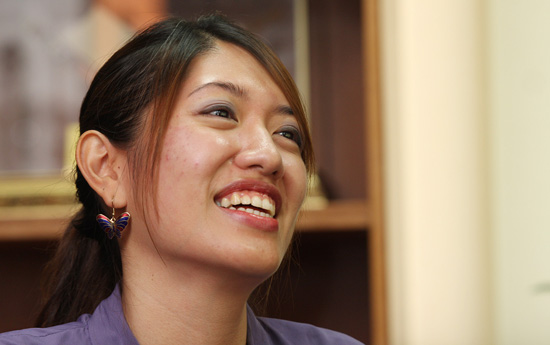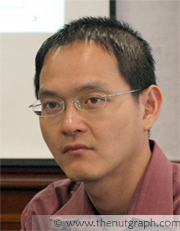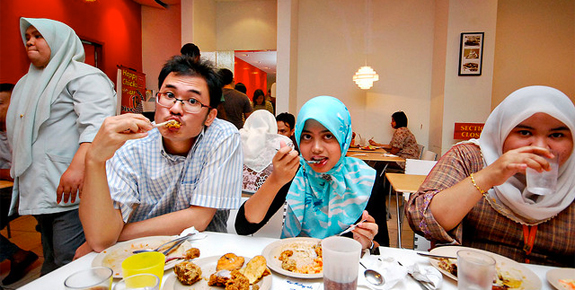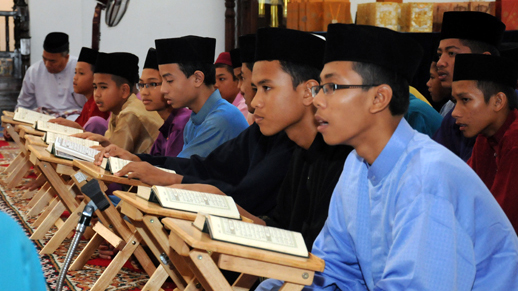Sideways by Deborah Loh | The Nut Graph
HOW many non-Muslims do you know who fast during Ramadan? And why would they?So far, I’ve found two non-Muslims who are conscientiously fasting the whole of Ramadan. Of these two, one fasts the Muslim way, eating only at sahur and iftar in accordance with the Muslim prayer times. The other doesn’t follow the fasting timetable and does a partial fast of eating only one meal a day at dinner.
There were more I spoke to who said they fast but only for a day or two out of the entire month of Ramadan. For this, what I call the “casual” group, fasting usually means skipping lunch and only eating in the evening, usually because a buka puasa buffet feast with Muslim friends has been planned in advanced.
The reasons for non-Muslims fasting during Ramadan included a) wanting a personal challenge, b) to accompany Muslim friends or colleagues, or c) to show solidarity.
Showing solidarity. Er, but why?
It’s “to show solidarity” which intrigues me the most. I’ve found that overall, among non-Muslims who’ve fasted during Ramadan whether conscientiously or casually, “solidarity” was the first thing off the top of their heads when I asked why they did it.
And yet, just what does “showing solidarity” mean in our context where Muslims and Malay Malaysians are the majority? And where non-Muslims have to abide, not by choice but by decree, to various directives such as a ban on new non-Muslim clubs in schools and a ban on using the word “Allah” when it isn’t exclusive to Islam?
Or where non-Muslims have no say in the unilateral conversion of children if one’s spouse converts to Islam, and have to give up burial rightsover a deceased Muslim family member’s body? Why should solidarity be shown with the majority if such are the circumstances for the minority?
Unpacking solidarity
Maybe I am totally wrong in looking at solidarity this way. Maybe I am taking politics too personally. But I think, after awhile, even the toughest of cynics cannot help but feel disheartened and resentful of the frequent labelling of non-Malay Malaysians, and by extension, non-Muslims, as “pendatang”, as ingrates, and as plotters who will one day take over the country.
As if to reinforce the position of non-Muslim citizens in Malaysia, the cow-head protestors were merely fined RM1,000 for illegal assembly, no charges were pressed against the Al-Islam magazine reporters, and a police report has now been lodged against a church for staging a play during Ramadan.
How do I not let such insults and disrespect eat into me? One could say that it’s all just political posturing or media spin. And yes, that may be true but only some of the time.

Ahmad Ismail (source: Oriental Daily), against a map of Malaya (public domain. Source: wikipedia.org)
What about the times lesser-known figures like Datuk Ahmad Ismail, Datuk Nasir Safar, and most recently, a school principal in Kulaijaya, Johor, said similar things about non-Malay and non-Muslim Malaysians? These incidents suggest that it isn’t always just politics; that such views do have currency on the ground. Maybe Utusan Malaysia is merely reinforcing is subscribers’ perceptions. Maybe Perkasa is just echoing the voice of its 200,000 members.
Confused, I asked two non-Muslims who fast during Ramadan why they do it and what they get out of it. It’s best to let their own words speak for themselves.Tricia Yeoh, Selangor state government researcher:
“I observe the full fast timetable, waking up for sahur at dawn and breaking fast at iftar in the evening.
“Despite the fact that we [in Malaysia] are so exposed to different communities, many of us either can’t be bothered or don’t have the initiative to truly take the effort to understand the other.
“I don’t think [the question of solidarity with the majority or minority] matters. As a human being, my commitment and my responsibility is to do what I can to understand people and the environment around me.

Tricia Yeoh (pic courtesy of Tricia Yeoh)
“[Disciplining the body also] makes you question whether there are other excesses I don’t need. It gets you focused on what’s important in life and often that comes back to the communal aspect of coming together as a family or as a people. I wake up for sahur alone in my house as I’m the only one in my family doing it, but knowing that there are hundreds of thousands of families all doing the same thing at the same time is special. As much as possible, I try to break fast with others who are Muslims.
“The communal experience is a beautiful thing that we sometimes lose in an increasingly individualistic society. But if we were to think bigger, then communal also means looking out for the nation’s best interests. Those who are fasting should be reminded that there’s a greater purpose out there and the borders between races ought to thin. It’s all the more essential for everyone to step into the shoes of the ‘other’ in this time and age. We all have to make these efforts, these baby steps.”
Dr Ong Kian Ming, political analyst and USCI lecturer:
“I don’t follow the fasting timetable strictly. I fast in the sense that I eat only one meal a day at dinner. It’s to stand in solidarity with Muslims and it is also good discipline for me. It’s about learning to control my physical appetite and is the part of Ramadan I find attractive — learning to mengawal nafsu, or controlling one’s desires.

Ong Kian Ming
“Extending these ideas about controlling desires and understanding the other to a national level, I think we ought to fast from the desire to be accusatory of each other and instead try to see things from each other’s perspective.
“I also have a personal dimension to fasting and I’m fasting for Sarawak because of several issues — state elections might be held soon, the bumiputera rural population there have been severely neglected, and I’m fasting as a way of hoping that change will come for these people. I try to accompany my fast with prayer and to give to charity whatever money I save from not eating.”
Pockets of hope
I’m still not fully convinced about the need to show solidarity if that is the reason for participating in a Ramadan fast as a non-Muslim. Maybe I am selfish and want some kind of reciprocation in understanding, or I unnecessarily attach too much political baggage to the idea of adopting aspects of the dominant culture and religion.
I do agree, however, that it is important to step into the shoes of the other. And maybe the value of fasting and breaking fast with Muslim friends is to at least remember that despite the prevailing national rhetoric, there are still pockets of hope where genuine interfaith friendships exist.




